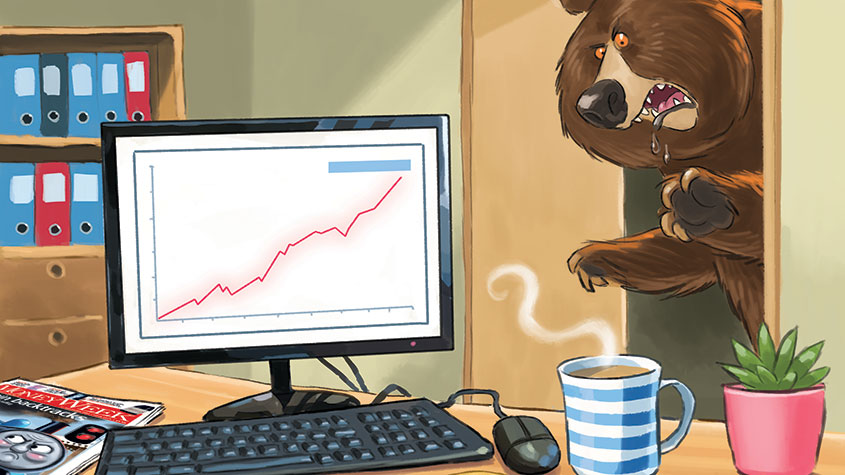Is the US stockmarket in a bubble?
One of the world’s top bubble-spotters doesn’t see in US stocks any signs of the euphoria that traditionally attends a bubble.

Get the latest financial news, insights and expert analysis from our award-winning MoneyWeek team, to help you understand what really matters when it comes to your finances.
You are now subscribed
Your newsletter sign-up was successful
Want to add more newsletters?

Twice daily
MoneyWeek
Get the latest financial news, insights and expert analysis from our award-winning MoneyWeek team, to help you understand what really matters when it comes to your finances.

Four times a week
Look After My Bills
Sign up to our free money-saving newsletter, filled with the latest news and expert advice to help you find the best tips and deals for managing your bills. Start saving today!
Is the US stockmarket in a bubble? One of the world's top bubble spotters doesn't think so. Jeremy Grantham, well-known value investor and co-founder of US asset manager GMO, told The Wall Street Journal's James Mackintosh that he doesn't see any signs of the euphoria that traditionally attends a bubble. He pointed out that, until recently, investors were happy to stick their money in "safe" government bonds paying negative interest rates. This, he says, is not emblematic of a "mad desire to invest in the stockmarket". So is he piling in? Not for a moment. US stocks are expensive, no doubt about it, he says. But he might think about buying on a "dip" of 15%-20%.
So what, if anything, justifies current valuations in the US? Michael Batnick, who writes for The Irrelevant Investor blog, highlights a paper by Michael Mauboussin and his team at Credit Suisse (one that we covered on the strategy page in MoneyWeek a couple of weeks ago). The paper looks at the fact that the number of firms going public in the US has fallen by half over the past 20 years. One side-effect of this is that those companies which are listed are both more mature and more profitable. On one measure, margins have risen from 5.5% on average pre-1996 to 9.1%. Grantham makes a similar point, and you could certainly argue that a market made up of more profitable companies should trade at a premium to one composed of less profitable ones. That said, notes Batnick, even if stocks aren't "really" expensive, they're at best, only "sort-of" expensive.
The thing is, US stocks have been expensive to one degree or another for several years now, on almost any measure you care to mention. So the fact that they're approaching record valuations now is no guarantee that they won't continue to sail on higher. So what's an investor to do? You could decide to dance around on the side of the volcano and hope that it doesn't erupt any time soon. Alternatively, you as an individual investor could exploit your one big advantage over the likes of GMO and other asset managers, which is that you don't have to worry about your clients abandoning you if you aren't fully invested in a rising market.
MoneyWeek
Subscribe to MoneyWeek today and get your first six magazine issues absolutely FREE

Sign up to Money Morning
Don't miss the latest investment and personal finances news, market analysis, plus money-saving tips with our free twice-daily newsletter
Don't miss the latest investment and personal finances news, market analysis, plus money-saving tips with our free twice-daily newsletter
You don't need to own the world's most expensive market, even if it is going up. Instead, hunt for value. We look at the latest updates on Cape ratios for global markets on page ten (where we remind you what the Cape is too). The US is the second-most expensive market in the world on that measure (Denmark is the most). The cheapest include troubled eurozone players Italy and Portugal. But this week's cover star Poland also makes an appearance. You can read more on how to invest in one of Europe's most under-appreciated markets here.
Get the latest financial news, insights and expert analysis from our award-winning MoneyWeek team, to help you understand what really matters when it comes to your finances.

-
 ISA fund and trust picks for every type of investor – which could work for you?
ISA fund and trust picks for every type of investor – which could work for you?Whether you’re an ISA investor seeking reliable returns, looking to add a bit more risk to your portfolio or are new to investing, MoneyWeek asked the experts for funds and investment trusts you could consider in 2026
-
 The most popular fund sectors of 2025 as investor outflows continue
The most popular fund sectors of 2025 as investor outflows continueIt was another difficult year for fund inflows but there are signs that investors are returning to the financial markets
-
 What to do as the age of cheap money and overpriced equities ends
What to do as the age of cheap money and overpriced equities endsEditor's letter The age of cheap money, overpriced equities and negative interest rates is over. The great bond bull market is over. All this means you will be losing money, says Merryn Somerset Webb. What can you do to protect yourself?
-
 Investors are bullish – but be very careful
Investors are bullish – but be very carefulEditor's letter Many investors are buying the dip, convinced the latest upswing is the start of a new bull market. The odds are that it’s not, says Andrew Van Sickle. The bear has unfinished business.
-
The MoneyWeek approach to investing
Editor's letter At MoneyWeek, our aim is simple: to give you intelligent and enjoyable commentary on the most important financial stories, and tell you how to profit from them. So how do we do that?
-
 Celebrity bitcoin ads echo the subprime mortgage crisis
Celebrity bitcoin ads echo the subprime mortgage crisisEditor's letter A wave of ads featuring celebrities punting crypto to the masses are reminiscent of how low income Americans were encouraged to take on loans they couldn’t afford, says Merryn Somerset Webb.
-
 Will the UK's property slowdown turn into a house-price crash?
Will the UK's property slowdown turn into a house-price crash?Editor's letter As the cost-of-living crisis intensifies and interest rate rise, it is hard to see reasons for UK house prices to keep rising, says Merryn Somerset Webb.
-
 The unintended consequences of ESG investing
The unintended consequences of ESG investingEditor's letter Many people are refusing to invest in energy companies, citing "ESG" concerns. But we still need fossil fuels, says Merryn Somerset Webb, and will for years to come. Boycotting the sector is a bad idea.
-
 What sardines can teach investors about today's markets
What sardines can teach investors about today's marketsEditor's letter A California tale of “eating sardines” and “trading sardines” can help us divide investments into speculative and real, says Merryn Somerset Webb. Something that's very useful when looking at today’s markets.
-
 The market finally seems to be getting it
The market finally seems to be getting itEditor's letter Reality checks are coming fast to the markets, says Merryn Somerset Webb – with even 2022’s safe havens beginning to reflect recession worries.